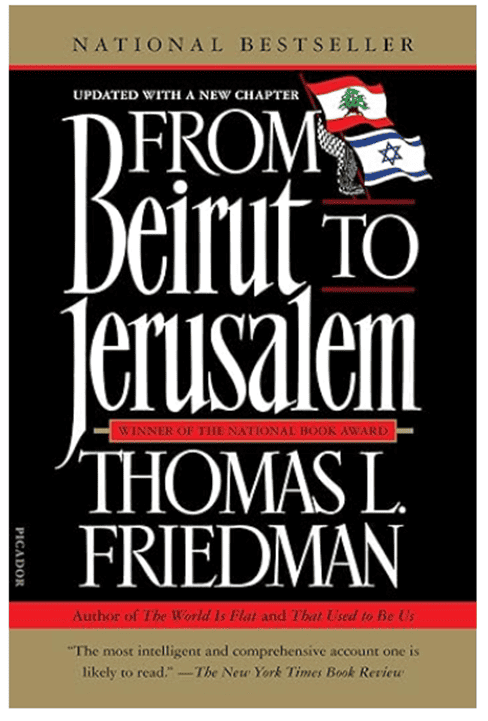By Jim Heffernan
I chose this book because I was seeking a better understanding of what drives the madness between Israel and its neighbors. The book is thirteen years old, but little has changed in the intervening years.
The book is primarily about the ten years the author spent as the New York Times correspondent in Beirut and Jerusalem in the 1980’s. Friedman is an excellent writer and how won 3 Pulitzer Prizes for Journalism and this book won The National Book Award in 1989.
The author spent 5 years in Beirut and then was transferred to Jerusalem for another 5 years. Beirut was once called the “Switzerland of the Middle East”, but that time passed around 1975. Now, Christians, Moslems, and Israelis’ have been perched on the edge of a civil war that has flared repeatedly in the intervening years. Friedman describes it all with a even-handed viewpoint that reveals the savagery and brutality that characterizes all sides of the conflict. He uses a line that haunts me, “Until we learn to love our children more than we hate each other, we are doomed.”
His time in Jerusalem is only a little less harrowing than his time in Beirut. His time there includes the beginning of the “Intifada” period. Life in Israel is dependent on the 20% of its population who are Moslem and the thousands of Palestinians who commute for work from Gaza and the West Bank. This represents a level of conflict and distrust that is hard for me to fathom.
My favorite part of the book is when Friedman veers into fantasy and imagines some far-seeing Israeli Prime Minister presenting a deal to the Palestinians that might quell the un-remitting cycle of peace-war-preace-war that plagues the region.
At the moment, I think the Netanyahu government is too fixated on revenge* for it to be anything other than a fantasy, but it sure is something to wish for. Here’s an excerpt from the end of the book …
“My friends, if there is one lesson that we can learn from the past hundred years of conflict with the Palestinians, it is this: As long as your neighbor is your enemy, your house will never be a home. It will be a fortress, and in a fortress, you can never really take your shoes off and relax. What this means is that we will never really be able to feel at home here in Palestine, we will never really be able to end our exile, unless the Palestinians, our neighbors, feel at home as well. I wish this were not the case. But the truth is we cannot save ourselves unless we save them too. And they cannot save themselves unless they save us too. But can we save them without committing suicide, which we are not going to do? And can they save us without totally surrendering, which they are not going to do?”
“In order to make a settlement with the Palestinians both possible and meaningful, I believe we Israelis, for our own self-interest, must begin by doing for the Palestinians what Anwar Sadat did for us: give them at least part of a seat on the subway, or at least recognize the validity of their reservation. Specifically, we should declare our readiness to accept the establishment of a Palestinian state in parts of the West Bank and Gaza Strip. Just as it was Sadat, the one who had the seat on the subway, who had the strength and self-confidence to move over a bit for his own good and make room for the ones who had no seat, so we Israelis, who have a seat, should use our strength and security in order to move over and make some psychological and physical space for the Palestinians so they can stop focusing exclusively on their rights and start thinking more about their interests. The Palestinians will have a real incentive to curtail their demands and control their most extreme elements only when they have some real interests to lose. Today the price for Palestinians of attacking Israel is bad headlines and a few casualties. If they had their own state, the price of attacking Israel could be the loss of everything they had managed to build.”
“But we are not in the charity business. We would make our offer to the Palestinians only if their representatives-whoever they might be, accepted the following three conditions.” “First, the Palestinian representatives would have to agree to explicitly recognize our right to exist as a Jewish state in the Middle East.”
“Second, the Palestinian representatives would have to agree that their state would be permanently demilitarized, and that Israel would be allowed to maintain all the early warning and security systems which its army deemed necessary to ensure that this Palestinian state could never-ever-threaten Israel’s existence, even if it wanted to. Israel and Israel alone would monitor the demilitarization of the Palestinian state through such measures as advanced observation posts and checkpoints at the Jordan bridges and all other potential entry points to ensure that no heavy weapons whatsoever could be brought in. There would be no UN troops and no multinational forces. We will not entrust our vital security to third parties. Only by totally controlling Palestinian capabilities will it be possible to get a majority of our people to overlook Palestinian intentions, poetry, and PLO charters. Neither we nor the Palestinians can be expected to dispense with our dreams about Palestine; they are fundamental aspects of our identities. But we cannot allow each other1s fantasies to prevent a settlement in reality.”
“Third, the Palestinians must agree that implementation of this plan would occur in stages over a period of five years. It would begin with free Palestinian elections in the West Bank and Gaza Strip (in which outside Palestinians could vote by absentee ballot) to form a government. Only when the Palestinian movement is transformed into a concrete state like autonomous government based in the West Bank will it have the attributes, incentives, and credibility to recognize the Israelis in a way that will be as meaningful and reassuring as the recognition from Egypt. That Palestinian government will be granted autonomy over all those areas that will eventually be relinquished to it by Israel at the culmination of the transition period. Only such a lengthy transition period, which puts the declarations of each side to the test, can produce the kind of healing and trust that will make an agreement workable and lasting.”
“Now you will ask, What if the Palestinians, when presented with such a state by us, don’t behave according to their rational interests, but instead on the basis of their rights, as they see them? What if they use such a state not to heal their dreams about recovering all of Palestine, but instead to feed them? The answer is that their state will only come to them in stages of autonomy, after they have proven their willingness at each stage to be responsible neighbors. If at any time in that process they physically endanger us in any way, the entire process will be scrapped. But we will be as much a loser from that as the Palestinians.”
“Let me add a few remarks to our Palestinian neighbors. My neighbor, my enemy, I know many of you will look at this plan and consider it insufficient. You are only going to get a ministate in part of the West Bank and Gaza Strip-less even than what you were promised in the 1947 UN partition plan. And even that is not going to be a fully sovereign state, because you will be in effect surrounded by Israeli troops, subject to Israeli security measures, and only be allowed to maintain a police force with light weapons. But to these complaints I can only say two things. First, what you could have had in 1947, you cannot have now; and what you can get today, you won’t be able to get tomorrow. I urge you to stop focusing only on what you think is right and just and to think instead only about what is possible. This is the most that is possible today. As for not being able to have an army of your own, you have to make a choice. Do you want a state or do you want an army? If it’s an army you want, then you already have one in the PLO. If it is a state you want, then it is a state I am offering-but these are the terms.”
“As for my Israeli critics, I can only say that while this plan may seem to you to be a noble offer-too noble, too moralizing, too naive-I consider it quite Machiavellian. I am trying to turn my enemy who never allows me to feel at home in my own house into a neighbor with whom I can live comfortably side by side. I have a healthy respect for the ability of all parties to this conflict, both the Palestinians and ourselves, to behave in totally irrational ways. I am in no way suggesting that this approach is risk-free. It is not. But the status quo is not risk-free either. Real Israeli security can never come from the club, but only from having a neighbor who is a dignified, responsible, and self-determining human being. Maybe the Palestinians are not willing to be such a neighbor and maybe the Arabs are not willing to allow the Palestinians to be such a neighbor. But better for us to take the very limited risk of putting the Palestinians to the test and possibly create a new relationship than to continue with an equally risky status quo that promises only an endless war between neighbors and a future filled with yesterdays.”
I hope that someday, logic prevails, but I fear hatred and the blind lust for revenge may keep that from happening.
525 Pages, Published April 9, 2010. 4.1 on Goodreads, 11,647 ratings
Available at Cloud and Leaf Bookstore, Manzanita and Tillamook Public Library (Hoopla)
* Friedman wrote a wonderful op-ed for New York Times on December 1 that can be found at, https://www.nytimes.com/2023/12/01/opinion/israel-gaza-ceasefire.html?searchResultPosition=4
It’s a worthwhile commentary on the situation in the Middle East and on our own missteps following 9-11.
If you have trouble with link to op-ed because of subscription issues, contact me at codger817@gmail.com and I can send you a PDF version. Discussion welcome at same e-mail address.


